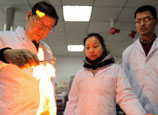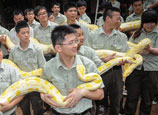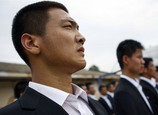
 |
| Author Yang Zewei says she wants to show how she feels through her novel There Is Nothing Like a Cat. (China Daily) |
Chinese writers under 30 are stepping into the limelight with the New Wave series released in June.
Bai Ye, a literary critic who has traced the post-1980 generation for more than 10 years, spoke at the book launch, praising the young writers' works.
"I used to worry that they would never come of age," he says. "I don't have that worry any more."
The series consists of three novels. There Is Nothing Like a Cat looks at urban relationships from the eyes of a cat; Bian Wai talks about a young man's aspirations to work in the bureaucratic system; and Qing Ci depicts a tormented and out-of-control love life.
Its editor, Xing An, plans to publish prose, essays, literary reviews and other forms of literature by young writers in the next few years.
"I want to show the post-1980 generation's real power," Xing says. "They should play a much bigger role in the writers' club."
But unlike their predecessors, their contribution to the canon of Chinese literature will not be sweeping epics of history and the nation.
"We see this group focusing on novels more than other genres," Bai says. "They're direct, smart and very personal.
"They are not interested in grandiose ideas and historical narratives. They tend to look more at their own life and feelings. Stories about unimportant, everyday people is the trend."
Yang Zewei, author of There Is Nothing Like a Cat, says, "Youth is beautiful and cruel. I just want to show how my heart feels."
The 27-year-old says she was inspired by a cat she met at a Starbucks cafe in Xi'an, Shaanxi province.
"We are young. We struggle. We are often in pain and have a lot of problems," she says. "I'm writing to answer this question — what does the heart really want?"
Jing Da, 27, is a soft-spoken author who writes about family life.
"I write to show a family's impact on a young woman's growth."
However, the writers deny they are similar and insist the post-1980 generation is made up of diverse writers who have little in common.
"I hate the label," Jing says. "I hope readers will understand that we don't just write about youth."
Yang says, "I don't want to be treated like a kid instead of a grown-up, professional writer."
Bai, a researcher with the Institute of Literature at the Chinese Academy of Social Sciences, agrees every writer has unique features.
"But they've all started with this — there is no 'we', only 'I'," Bai says.
"Now, all they need is attention and focus, and to ditch the half-heartedness."
















 Chengguan, sometimes criticized for brutal force burdened by reputation
Chengguan, sometimes criticized for brutal force burdened by reputation


![]()
